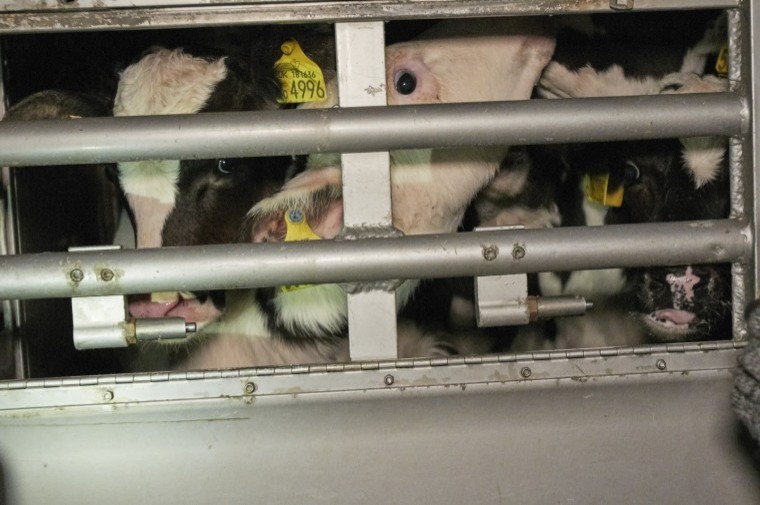The RSPCA is making fresh calls for a ban on the long distance live export of animals, after a lorry transporting 247 calves was turned away from embarking on a delayed ship at Ramsgate Port.
RSPCA and government officials stepped in on 10 January to ensure the exhausted animals were taken to a lairage to rest to avoid exceeding the legal maximum transport time.
A lorry transporting a large number of young calves set to sail overseas on a delayed ship, was stopped by RSPCA, government officials and police to ensure that the animals rest before continuing their journey. Calf exports have recently resumed through Kent to the continent for the first time in five and a half years, with journeys beginning in Scotland destined for Spain. It is estimated that on this occasion the journey may have taken a gruelling 70 hours – including rest stops.
Current law states that calves must not be transported for more than nine hours without an hour rest period, and not longer than 21 hours before a 24 hour rest. The lorry had arrived at the Port of Ramsgate but because the ship it was destined to embark on was delayed, making the animals’ travel time exceed the legal limit, officials prevented the lorry from continuing the journey, and it was directed to a nearby lairage for the calves to rest.
John Avizienius, ruminant welfare specialist at the RSPCA, said: “This is a stark reminder that our current laws do not go far enough to protect those animals transported across long distances.
“Currently transport companies arrange and time the distances down to the minute to take these animals on a journey as long as legally possible, but this week’s journey shows that just one delay can mean a breach of the law.
“This is the first time in several years that we’re aware of a lorry being turned away from the port and sent to a local farm to rest. It is positive to see that the law was being enforced in this instance, but we believe the law doesn’t go far enough to protect the animals
“Until the long-distance live transport of animals is banned completely, we can never be sure that animals will not continue to suffer on these long, arduous journeys across the continent. Currently, sheep, calves, chickens and horses are all exported from the UK, and once they’re off the ship on the continent, we aren’t there to protect them and don’t know how long they’ll be transported.
“Having seen photographs of the calves, we have concerns about their hydration and general health and the question needs to be asked as to whether they were really fit to travel? , The RSPCA wants to see an end to this cruel practice.
The European Parliament has long expressed concern for the welfare of animals transported for long distances.
David Bowles, assistant director of public affairs at the RSPCA, said: “In December the Parliament’s Environment, Petitions, Agriculture and Transport Committees repeated that Member States do not properly comply with or enforce the necessary animal welfare protections and that it is difficult to meet the welfare needs of animals during long distance transport.
“In a vote on Monday 3 December 2018, MEPs in the transport committee backed calls for stronger regulations including a four-hour limit on live transportation for slaughter and an eight-hour time limit on any live animal transport. The report also demanded a four-hour limit on any transport of unweaned calves and an effective ban on exports outside of Europe, where EU animal welfare laws cannot be enforced.
“These calls for reduced journey times, better animal welfare provisions and much stricter enforcement by member states were also voted through by the Environment Committee. However, the EU Commission has always ignored these calls so we need the Governments in the UK to take advantage of Brexit and bring an immediate end to these journeys and this suffering.”




